Posted by admin on May 3, 2017 ·
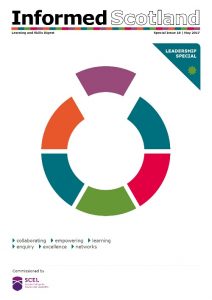
.
We’re delighted to publish an Informed Scotland Leadership Special. It was commissioned by the Scottish College for Educational Leadership (SCEL) and launched at their major conference in Perth on 3 May 2017.
Gillian Hamilton, Chief Executive of SCEL said, ‘Building leadership capacity at all levels through collaborative learning is crucial and must be a priority in education and beyond’.
The SCEL conference, facilitated by Lyn Sharratt, Beate Planche and Maggie Ogram from Collaborative Networks for Learning, set out to ‘deepen understanding of the power of collaboration as a leadership and learning approach’ – at all levels, from the classroom teacher to the education system leader.
It’s clear from our research for Informed Scotland, that improving leadership is a key focus for many organisations right across the learning and skills landscape – including in business, further and higher education, community and adult learning, third sector and government, as well as schools.
In commissioning the Special, SCEL wanted us to capture the breadth of what’s happening and make connections with their own growing portfolio of programmes, resources and support for teachers and leaders at all levels. Practising what they preach, they’re keen to learn from others!
Like all Informed Scotland publications, the Leadership Special aims to encourage everyone to look beyond the usual places for inspiration.
Download: Informed Scotland Special 10: Leadership
See #SCEL2017 for tweets about the conference.
Previous Informed Scotland Specials can be downloaded here.
Posted by admin on April 27, 2017 ·
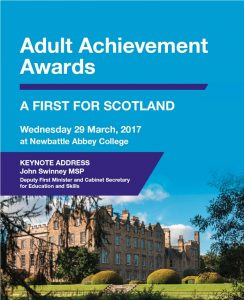 by Jackie Borge of Borge Consulting. Continuing our guest blog series featuring Informed Scotland subscribers writing on the theme Making connections across the learning & skills landscape.
by Jackie Borge of Borge Consulting. Continuing our guest blog series featuring Informed Scotland subscribers writing on the theme Making connections across the learning & skills landscape.
I’ve worked in adult learning for almost three decades, yet I still feel a tug on my heart strings when I hear how learning has affected people and changed their lives for the better. And that’s exactly what happened when I attended Newbattle Abbey College’s adult education conference in March for Informed Scotland.
The day was a celebration of the Adult Achievement Awards, developed in 2014 at the request of SCQF Partnership and Education Scotland, and credit-rated by Edinburgh Napier University in 2015.
Through a mix of keynote speakers, workshops and group discussions, attendees heard about the successes of the pilot programme and about plans for the future. We heard learners talk about feeling more confident, about experiencing achievement and recognition (often for the first time in their lives), and of having a passion and desire to continue learning, ‘It’s opened me up to be hungry, to have more… I want more now’.
During his keynote speech, John Swinney MSP, Cabinet Secretary for Education and Skills, talked about the importance of ‘supporting adult learners to achieve their potential’ and ‘ensuring that we have accessible learning in communities’.
Cath Hamilton, Education Officer with Education Scotland, reported on national priorities and developments in adult learning, and mentioned ‘the importance of cross-sectoral and partnership working for us all to realise our ambitions for adult learning in Scotland’.
The pilot programme has been running since 2015 and Marian Docherty, Newbattle Abbey College’s Depute Principal, reported on some of its key successes, including:
- 29 pilots delivered across Scotland and one in the Isle of Man
- 450 learners and over 100 tutors engaged across sectors and settings, including in the community, at home, in college, at work and through volunteering programmes.
Marian also shared information about plans for the future and delegates were asked to provide feedback. The plans are exciting and ambitious and include: rolling out the Awards across Scotland, the rest of the UK and Europe; engaging providers and employers; and developing a new Award at SCQF Level 2.
I am looking forward to seeing what the future brings, to a time when the Awards are a ‘must have’ for individuals and when employers recognise the value of the qualification.
Jackie is also an associate, AJ Enterprises.
For further information email [email protected] and follow @borgeconsulting on Twitter.
Read previous guest blogs in the series, including those from GTC Scotland, Be Personnel, SCEL, Clyde Gateway, EDT Scotland and SCQF Partnership.
Posted by admin on April 10, 2017 ·
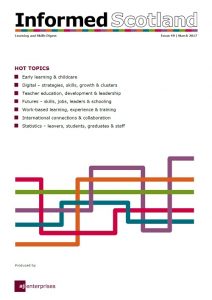
.
Early learning made it onto the Hot Topics list for only the third time in 49 issues. The main reason was publication of the Scottish Government’s Action Plan for Early Learning & Childcare (ELC).
Even if ELC isn’t usually on your radar it’s worth taking a look, as there are actions relevant to pretty much all sectors. For ease of reference our subscribers will see all 31 actions in an Annex. Skills Development Scotland also published the first ELC Skills Investment Plan in March.
Another key report that spans most sectors is Education Scotland’s Quality & Improvement in Scottish Education, covering from early years to colleges and community learning.
Interesting reports to delve into this month include City & Guilds’ Generations at Work, the Association of Graduate Recruiters’ Student Development Survey, and Business in the Community and City & Guilds’ study of jargon-filled, off-putting entry-level job descriptions.
A new Centre for Work-Based Learning in Scotland was opened – not to be confused with the School for Work Based Education, formerly the Scottish Centre for Work Based Learning, at Glasgow Caledonian University. And it was announced that Individual Training Accounts are to replace Individual Learning Accounts later this year.
Meanwhile, both the Federation for Community Development Learning and UK Commission for Employment & Skills closed down. The response to the UKCES Chief Executive’s farewell comment on LinkedIn shows we’re not alone in mourning the loss of this unique organisation that straddled and made sense of the UK skills landscape.
It was a busy month on the Learning & Skills Events Calendar, too.
The 7th International Summit on the Teaching Profession took place in Edinburgh, organised by UK and Scottish Governments, OECD and Education International. As well as the annual Scottish Apprenticeship Week, the first Scottish Financial Education Week was held. We were delighted to showcase Informed Scotland at the final day’s conference at Murrayfield, live tweeting throughout. Thanks to visitors to our stand – we hope you’re enjoying your free copies of Informed!
We also made it along to two events looking to the future: Nesta’s Future Jobs; Future Prosperity at University of Edinburgh, and Goodison Group in Scotland’s debate on Future Schooling, Learning and Education Approaches at the Scottish Parliament, with discussion led by Prof Mark Priestley of Stirling University. This will feed into Scotland’s Futures Forum’s Scotland 2030 Programme, which also kicked off in March.
A reminder that we’re working on a Leadership Special commissioned by Scottish College for Educational Leadership to coincide with their annual conference in Perth on 3 May.
Feedback that made us smile last month: ‘Informed Scotland unlocks critical information for interested parties without them having to know or remember everything!’
Become an Informed Scotland subscriber so you can keep on top of all the developments. Email [email protected] to request a sample copy.
Posted by admin on March 9, 2017 ·
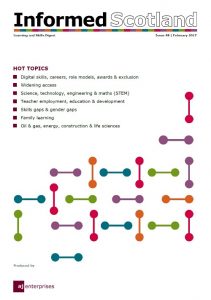
.
February might have been the shortest month, but it certainly wasn’t the quietest. As usual there were numerous sets of statistics, plus new strategies, task groups, courses, announcements, launches and partnerships.
The learning & skills word of the month was ‘hub’:
Interesting reports published in February included Education Scotland’s first Review of Family Learning, City & Guilds’ survey of companies eligible to pay the Apprenticeship Levy, and the Sutton Trust’s Global Gaps analysis of the latest OECD PISA results, prompting quite a debate. (Worth checking out an article in TESS on the Sutton Trust report, from the Scottish Network for Able Pupils.)
There was also an increased focus on the role of evidence; in the current climate of ‘fake news’, anti-experts, anti-intellectualism and ‘data deniers’, this is to be applauded and encouraged! For example, EIS published Myths of Immigration booklets for teachers, Education Scotland started an #InspectionMythbusters series, and Alliance for Useful Evidence & CarnegieUK Trust published The Scottish approach to evidence discussion paper.
A reminder that we’re working on a Leadership Special commissioned by Scottish College for Educational Leadership to support their annual conference in Perth on 3 May. There might even be spaces left to attend – if you’re quick!
Become an Informed Scotland subscriber so you can keep on top of all the developments. Email [email protected] to request a sample copy.
Posted by admin on February 10, 2017 ·
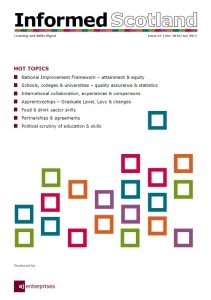
.
Once again there was no lull over the festive season with 2017 continuing at pace, ready to throw everything at the learning & skills landscape. Words of the year are already emerging: ‘equity’, ‘learner journey’, ‘streamlining’, ‘quality’ – and ‘challenging’!
You could be forgiven for having a sense of déjà vu, with the National Improvement Framework for schools back on the cover, just as it was a year ago, though this time it’s the final version. A new Pupil Equity Fund was also launched to help schools close the gap between the most and least deprived young people.
There was the annual glut of statistical releases, with a few notable additions – the first Achievement of Curriculum for Excellence Levels from Scottish Government and the first college Student Satisfaction and Engagement Survey from Scottish Funding Council. Missing was the school leaver destinations report, with Skills Development Scotland instead planning to concentrate on the new Participation Measure of all 16–19 year-olds in learning, training or work each August.
The Scottish Government published its response to the Apprenticeships Levy, as new work-based Graduate Level Apprenticeships were announced by a number of universities. There was an updated Food & Drink Skills Investment Plan from SDS, the well-covered OECD PISA survey, IPPR Scotland’s paper on challenges for the skills system, and the annual High Fliers Research Graduate Market report.
While elsewhere the talk is of walls and borders… we can’t help but comment on the numerous examples of international collaboration in this edition, including the upbeat Scotland’s Universities Welcome the World campaign.
The fourth annual Informed Scotland Learning & Skills Hottest Topics list, plus a round-up of last year’s activity, is in an Annex. You can also listen to an interview on Radio EDUtalk, when Angela and David Noble explored the stories behind the list, and looked at what’s on the horizon for 2017. And look out for mention of a Leadership Special we’ve been commissioned to produce for Scottish College for Educational Leadership to support their conference in Perth on 3 May.
Become an Informed Scotland subscriber so you can keep on top of all the developments. Email [email protected] to request a sample copy.
Posted by admin on January 25, 2017 ·
 In an interview for Radio EDUtalk, Angela took David Noble’s listeners on a whistle-stop tour of some of the items that will be shaping Scotland’s learning & skills landscape this year.
In an interview for Radio EDUtalk, Angela took David Noble’s listeners on a whistle-stop tour of some of the items that will be shaping Scotland’s learning & skills landscape this year.
You can listen to a podcast of the show, which also reviewed the hottest topics in 2016. Below are links to some of the programmes, projects and events mentioned for 2017:
Government programmes, reviews, strategies & funding
Current open consultations
Resources, opportunities & courses
Themed weeks & major conferences: full list on the Events Calendar
Keep yourself or your organisation better informed about what’s happening in learning & skills in Scotland. Find out how to subscribe here or contact [email protected] to receive a recent copy of the digest.
Posted by admin on January 9, 2017 ·
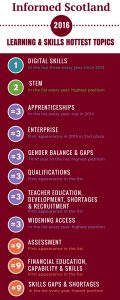
.
Here’s our fourth annual list of Learning & Skills ‘Hot Topics’ that made it onto the cover of Informed Scotland over the past year:
1. Digital & tech sector skills (=2 in 2015)
2. Science, technology, engineering & maths (STEM) (=4)
=3. Apprenticeships (=9)
=3. Enterprise (=2)
=3. Gender balance & gaps (=9)
=3. Teacher education, development, shortages & recruitment (-)
=3. Qualifications (-, although National Qualifications was =9)
=3. Widening access (8)
=9. Assessment (-)
=9. Financial education, capability & skills (-)
=9. Skills gaps & shortages (=4)
Although the list is produced by fairly unscientific methodology, each year it captures most of the hottest issues. Unsurprisingly, ‘Digital skills’ was back in the number one spot, having never been out of the top three since the list was first compiled in 2013.
‘STEM’ has also appeared in every list, however this year’s 2nd place is its highest position by far.
‘Apprenticeships’, ‘Widening access’, and ‘Skills gaps & shortages’ are the only other topics that have made every annual list – and they’re likely to remain hot issues in 2017.
All new entries appear for the first time, although National Qualifications was equal ninth in 2015.
It’s particularly surprising that there have been no previous listings of anything related to teacher education, development or employment. However with plenty happening, including Edinburgh hosting the International Summit on the Teaching Profession in March, we’ve a feeling it’ll be back on the list next year.
The biggest faller was ‘Developing the Young Workforce (DYW)’, missing from the list after topping the table in 2015. Although every digest has included numerous DYW items, it only made it onto two covers.
Despite 2016 being the Scottish Government’s Year of Innovation, Architecture & Design, ‘Innovation’ only made it onto one cover, with no showings of architecture or design. We’re therefore reluctant to predict an entry related to the 2017 Year of History, Heritage & Archaeology…
Angela will be reviewing the stories behind the list and looking at what’s in store for 2017 in an interview for Radio EDUtalk on 24 January. What were your 2016 highlights? What are your predictions for 2017? Tweet us @InformedScot.
Make it your New Year’s resolution to be better informed about what’s happening across learning & skills in business, schools, further & higher education, community & adult learning, and government & wider society. Contact [email protected] to receive a recent copy and find out how to subscribe here.
Posted by admin on December 20, 2016 ·

Image is © Tanami
2016 has been another busy year, so it’s a good time to take stock and say thank you!
As education moved onto the political centre stage, we’ve been working hard to keep Informed Scotland subscribers up to date with learning & skills matters. As well as the monthly digests, we published a Scottish Parliament Election Extra, the fourth annual Organisations & People Special, and three excellent subscriber guest blogs by SCEL, GTC Scotland and Be Personnel. Thanks to our subscribers who’ve provided some great feedback and been spreading the word about how they benefit from receiving Informed Scotland.
Through the Learning & Skills Events Calendar and social media sites we’ve kept a wider audience regularly updated about the opportunities and developments across the landscape. @InformedScot now has over 2,700 followers, an extra 700 since this time last year, and we’re now sharing images on Instagram – thanks to all our engaged followers! Special thanks to Lisa at Media Bloom for helping to keep the Events Calendar updated and for her social media expertise.
Angela has also provided consultancy and editing & proofreading services to repeat and new clients with business interests at home and abroad. Whether it’s been research, intelligence or horizon scanning, writing blogs or papers, or copy-editing and proofreading academic books, business websites, strategy reports or online courses, it’s been as fascinating as ever!
Personal thanks once again to associates including Janey at Mamook Graphics, Elaine at emh connect, and others I’ve had the pleasure of working with in 2016. That includes fellow Edinburgh Editors and members of SfEP – it’s great to be part of such a mutually supportive local network, impressively coordinated by Lesley Ellen.
Final thanks to Craig Dorrall, Video Production Manager at Tanami, for providing this year’s festive photo! Working alongside other businesses is invaluable, and it’s been a pleasure to encounter the creative, professional team at Tanami while working at Hanover House.
The annual Informed Scotland Hottest Topics in Scottish Learning & Skills will be shared here in January (see what made the list in 2015).
Email [email protected] for more information about any of the above, to subscribe to Informed Scotland, or to discuss how we could support your work in 2017.
Posted by admin on December 9, 2016 ·
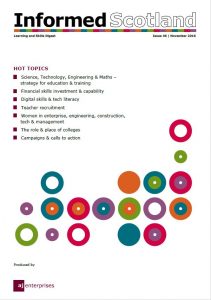
.
The phrase of the month was ‘call to action’, with campaigns and action plans right across the landscape.
The main publication was the Scottish Government’s consultation on a draft Science, Technology, Engineering & Maths (STEM) Strategy for Education and Training. The main proposed actions are included in an annex as a handy reference for our subscribers.
Other key publications to inform and challenge are SDS’s updated Financial Sector Skills Investment Plan, an action plan on Tackling the Gender Technology Gap by the Digital Technology Skills Group, Scottish Government’s proposals to speed up and grow teacher recruitment, and Colleges Scotland’s ‘Think Piece’ on the place of colleges in the Learning & Skills Journey.
As always, there were plenty of innovative developments to look out for:
A new Sales & Marketing Academy was launched by Klozers, Genoa Black and fatBuzz to reduce graduate unemployment/underemployment, supported by RBS in Glasgow. A new Construction & Technology Centre for school pupils was opened in Musselburgh by East Lothian Council and Edinburgh College, supported by Scottish Futures Trust and firms including Morrison Construction and Hart Builders. And a new Institute for Inspiring Children’s Futures is to be created at University of Strathclyde, in partnership with CELCIS and Centre for Youth & Criminal Justice.
More positive feedback from subscribers made us smile last month: John Butcher, Executive Director Education & Youth Employment, North Ayrshire Council said, ‘The overview is succinct, clear and very useful’, and Mary De la Peña, Chief Executive, CU Scotland commented, ‘allows us to keep up to date with the issues and developments that matter to us as a small educational charity; it saves us time and keeps us all informed’!
Become an Informed Scotland subscriber so you can keep on top of all the developments. Email [email protected] to request a sample copy.
Posted by admin on November 7, 2016 ·
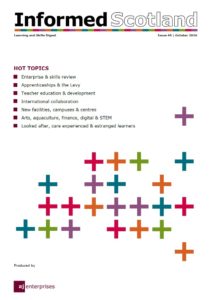
.
In terms of learning & skills, October felt less frantic.
The main items this month were the Scottish Government’s Enterprise & Skills Review Report of Phase 1, and plans for apprenticeships following a consultation of views in Scotland of the UK Apprenticeship Levy.
In both cases this is unfinished business. For the former, the focus shifts to how the ten actions will be implemented in Phase 2. For the latter, we await further clarification of how the Levy will impact employers and apprentices.
Other, less mainstream, items of note included Creative Scotland’s detailed and broad Visual Arts Sector Review. And an Aquaculture Growth strategy, in which skills development is a core priority, produced by a group involving Scottish Aquaculture Innovation Centre and Scotland Food & Drink among others.
As well as the usual new initiatives, partnerships, websites and resources, October saw the opening of numerous new facilities, including Clyde Training Solutions’ marine training centre in Clydebank, Ayrshire College’s Kilmarnock campus, Borders College’s Business Development Centre in Hawick, and North East Scotland College’s STEM Centre in Fraserburgh.
We’re always interested in how a word or phrase suddenly crops up all over the place – have you noticed the growth of ‘future-proof(ing)’, with or without the hyphen? In the October issue, according to a report by School for CEOs, it’s CEOs who need it!
Are you on Instagram? We’ve just created a brand new informedscot Instagram account to share images of learning & skills from across the country. Connect with us and tag your pictures with #InformedScotland so we can help you to share them!
Become an Informed Scotland subscriber so you can keep on top of all the developments. Email [email protected] to request a sample copy.









